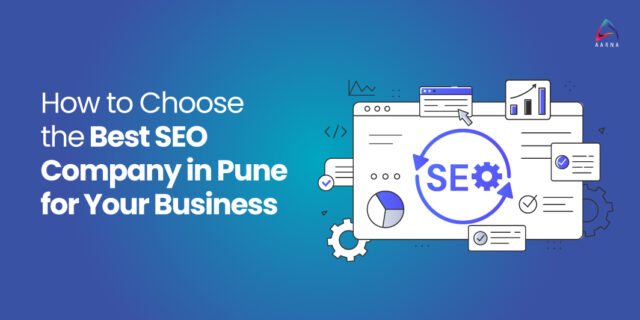When it comes to the real estate business, having a strong online presence is no longer optional—it’s essential. In an industry that thrives on visibility and trust, Search Engine Optimization (SEO) becomes a powerful tool to help real estate agents connect with potential clients, showcase their listings, and ultimately grow their business. However, success with SEO doesn’t come by accident; it’s driven by consistent efforts and monitoring the right metrics.
If you’re wondering where to start with your digital marketing journey, this guide will walk you through the 12 key SEO metrics every real estate agent should track [2025]. But before diving into the details, let’s understand why real estate agents need SEO in the first place. Whether you’re working with a trusted SEO company in Pune or managing your strategy independently, these insights will set you on the right track. Let’s begin.
Why SEO is Crucial for Real Estate Agents
In today’s digital world, homebuyers rely heavily on internet searches for properties, be it residential homes, apartments, or commercial spaces. This makes SEO a must-have tool for real estate agents who want to stand out in local searches and attract high-quality leads. Here’s why SEO should be at the heart of your real estate marketing strategy:
- Local Visibility: SEO helps you rank higher in specific regions, ensuring your listings are seen by potential clients actively searching in your area. For example, a strong focus on local keywords like “2 BHK flats for sale in [City Name]” can drive highly targeted traffic.
- Lead Generation: A well-optimized website ensures you rank for relevant searches, keeping your leads pipeline full with interested buyers or sellers.
- Cost-Effective Advertising: SEO is an affordable alternative to paid advertisements (which only work as long as you’re paying). The organic traffic generated by SEO builds your credibility and generates long-term results.
- Enhanced Customer Experience: SEO doesn’t just help search engines find your website; it ensures your site is user-friendly, loads fast, and provides relevant, quality content.
You simply can’t afford to leave your online presence to chance. If you’re not tracking the right metrics and not even working with any SEO agency for real estate, you risk being outperformed by competitors in your region. Now, let’s dive into the numbers you need to monitor.
12 Key SEO Metrics Every Real Estate Agent Should Track
Whether you’re collaborating with a trusted real estate SEO company or going the DIY route, these metrics will help you stay ahead in the game.
1. Organic Traffic
Organic traffic refers to the number of visitors who land on your website through unpaid search results (as opposed to ads or social media). It is a key metric to watch because it shows how many people are naturally discovering your business online. For a real estate agent, this could mean prospective buyers or sellers searching for properties in your niche or location. By consistently increasing organic traffic, you’re more likely to gain leads that are genuinely interested in your services. A high volume of quality organic traffic is a clear indicator that your SEO efforts—such as content creation, keyword usage, and optimization—are paying off.
Tips to Improve:
- Write blog posts focused on trending local real estate topics.
- Use long-tail keywords like “luxury homes in [city name]” to attract specific audiences.
- Ensure your website runs quickly and smoothly on both mobile and desktop devices.
2. Keyword Rankings
Keyword rankings measure where your website appears on search engines for specific search queries. Most online property searches are geographically specific, like “buy a house in [city name]” or “realtors near me.” Monitoring this metric allows you to see which relevant terms you’re ranking for and identify opportunities to rank higher for competitive terms. As a real estate agent, you’ll want to focus heavily on location-based keywords that match your services.
Tips to Improve:
- Research high-intent, long-tail keywords.
- Regularly update your meta titles, descriptions, and headings to ensure they contain target keywords.
- Test and refine your content strategies if rankings drop or stagnate.
3. Local Search Rankings (Google Business Profile)
Appearing in local searches is paramount for real estate agents because most clients search for listings and services in specific areas. Your presence on Google Business Profile heavily influences your visibility in local search results. An optimized GBP increases your chances of being featured in the Local Pack (the top three listings that appear in local searches).
Tips to Improve:
- Regularly update your Google Business Profile with new property listings, contact details, and images.
- Encourage satisfied clients to leave detailed, positive reviews on your GBP listing.
- Add FAQs and service-related updates to your GBP posts to keep your profile fresh and relevant.
4. Bounce Rate
Bounce rate measures the percentage of website visitors who leave after viewing only one page. A high bounce rate means users didn’t find what they were looking for or had a poor user experience. Reasons for high bounce rates could include slow-loading pages, irrelevant content, or poor website design. Maintaining a low bounce rate ensures that users are engaging deeper with your site, which is crucial for fostering trust and increasing lead conversions.
Tips to Improve:
- Optimize your web pages to load in under three seconds.
- Use clear CTAs (Call-to-Actions) like “Visit Site” or “Schedule a Home Tour” to encourage interaction.
- Create location-specific content that matches user intent, such as “10 Best Neighborhoods to Live in [City Name].”
5. Average Time Spent on Website
The amount of time users spend on your site reflects the quality and relevance of your content. If visitors are staying longer, it suggests they’re exploring your listings and finding your resources helpful. In real estate, longer time spent on your site might mean your property details, blog guides, or virtual tours are successfully engaging users.
Tips to Improve:
- Invest in video content, such as home walkthroughs and market insights, to keep users engaged.
- Add intuitive navigation menus and internal links to guide users across different pages.
- Implement interactive features, such as property search filters or mortgage calculators.
6. Click-Through Rate (CTR)
CTR measures the number of users who click on your website link out of the total number who see it on a search engine results page (SERP). A low CTR signals that your listing (title tag and meta description) lacks compelling language. For real estate, a high CTR significantly increases traffic to your website as you can draw in more potential customers who are actively browsing for properties.
Tips to Improve:
- Write enticing meta descriptions that highlight key offerings such as “Exclusive Listings” or “Prime City Locations.”
- Add urgency to titles, e.g., “Homes Selling Fast in [City Name] – Act Now!”
- Update property and location keywords dynamically to match market trends.
7. Conversion Rate
Your conversion rate measures how well your website turns visitors into leads or customers. For real estate agents, conversions might involve filling out a contact form, scheduling a consultation, or signing up for property alerts. A high conversion rate means your website is effectively driving users to take actionable steps closer to making a real estate decision.
Tips to Improve:
- Place CTAs prominently across your website pages, such as “Schedule a Free Property Consultation.”
- Incorporate trust signals like client reviews, success stories, or your years of experience in the market.
- Optimize lead forms to ask only for essential information, such as name, phone number, and email address.
8. Domain Authority (DA)
Domain Authority is a score developed by Moz (on a scale of 1-100) that predicts how effectively your website will rank on search engine results. Higher DA websites are seen as more trustworthy and credible by search engines. For real estate agents, building a high DA means you’ll outperform competitors on local search queries.
Tips to Improve:
- Generate backlinks by collaborating with high-authority blogs or websites within the real estate niche.
- Publish informative guides or resources users are likely to share, link to, or feature on their blogs.
- Regularly monitor toxic backlinks and disavow them using tools like Google Search Console.
9. Page Load Speed
Page load speed directly impacts the user experience. Slow websites can frustrate visitors and lead to higher bounce rates. For real estate agents, potential buyers or sellers are unlikely to wait for pages to load when searching for critical details about properties. A fast-loading site ensures higher engagement while improving your SEO scores.
Tips to Improve:
- Use a content delivery network (CDN) to speed up global content delivery.
- Optimize images by compressing their file sizes without losing quality.
- Minify CSS, JavaScript, and HTML to reduce page load time.
10. Mobile Usability
With the majority of shoppers browsing real estate listings on their mobile devices, ensuring a seamless mobile user experience is vital. Websites that aren’t mobile-friendly risk being penalized by Google and alienating potential clients. From easy navigation to fast mobile response times, mobile usability plays a significant role in real estate SEO success.
Tips to Improve:
- Use a responsive design to ensure your website adapts perfectly on tablets, smartphones, and desktops.
- Avoid intrusive popups that disrupt the browsing experience.
- Test the functionality of your pages regularly to address glitches quickly.
11. Backlink Profile
Backlinks are a core ranking factor in SEO and signify trustworthiness. A strong backlink profile indicates that other reputable websites link to you, which boosts your credibility in search engine rankings. For real estate agents, links from local news sites, real estate blogs, or industry directories can add authority to your website.
Tips to Improve:
- Partner with other local businesses or organizations to exchange backlinks that help both parties.
- Write guest posts for prominent real estate websites to earn valuable backlinks.
- Regularly audit your backlink profile for low-quality or spammy links that harm your rankings.
12. Social Media Engagement
Although not a direct ranking factor, social media signals play an indirect role by extending your content’s reach and driving organic traffic. Engaging with clients on platforms like Instagram, Facebook, or LinkedIn can amplify your brand authority and help promote your property listings effectively.
Tips to Improve:
- Post high-quality photos and videos of your properties to attract interest.
- Share blogs, market updates, and testimonials to establish yourself as an industry leader.
- Run social media ad campaigns targeting specific demographics aligned with your audience.
SEO is a Gamechanger for Real Estate Agents
Tracking the right SEO metrics isn’t just about numbers—it’s about knowing what’s working and where you can improve as a real estate agent. Partnering with a professional real estate SEO company in Pune can help you focus on what you do best—selling properties—while letting industry experts like Aarna Systems handle your SEO game.
We specialize in delivering tailored strategies for real estate agents that improve rankings, drive conversions, and generate more leads than ever before. Connect with our seasoned SEO experts today and watch your online visibility soar. Let us turn your real estate website into a lead-generating machine with Aarna Systems—the best partner in your digital marketing journey!
Ready to dominate your local market? Reach out to the top SEO agency for real estate and transform your SEO efforts into sales.
![12 Key SEO Metrics Every Real Estate Agent Should Track [2025]](https://www.aarnasystems.com/blog/wp-content/uploads/2025/01/Aarna_Dm_Blog_Image_04_31_December_2024-640x320.jpg)

